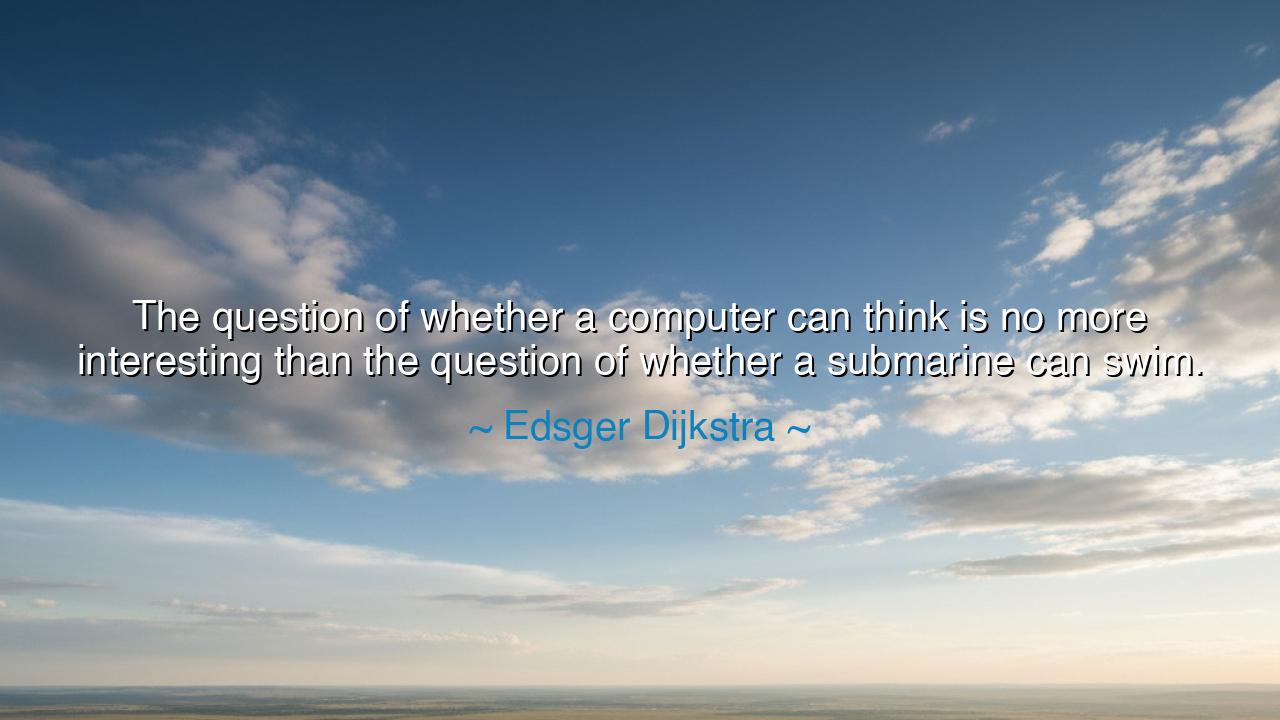
The question of whether a computer can think is no more
The question of whether a computer can think is no more interesting than the question of whether a submarine can swim.






Hear now, O Seekers of Truth, for the words of Edsger Dijkstra are a call to reflect upon the very nature of existence and our understanding of the world. He said, "The question of whether a computer can think is no more interesting than the question of whether a submarine can swim." At first glance, these words may seem simple, even playful, but they speak to a deep philosophical truth. They challenge us to reconsider the questions we ask and the assumptions we make about the world around us. To ask whether a computer can think is to misunderstand the very essence of what a computer is, just as to question whether a submarine can swim reveals a fundamental confusion about the nature of the machine.
A computer, like the submarine, is a creation of human ingenuity, designed with a specific purpose in mind. The submarine is not meant to swim as a fish does, but to navigate beneath the surface of the water. In the same way, the computer was not created to "think" as humans do, but to process data, to follow instructions, and to solve problems within the parameters set by its creators. The question is not whether a computer can think, but whether we, as humans, are asking the right questions about intelligence, consciousness, and the essence of what it means to "think."
Let us consider the great thinkers of the past, like the philosopher Aristotle, who sought to understand the nature of knowledge and reason. Aristotle did not ask whether tools like a hammer could perform tasks of human hands, but rather sought to understand the purpose of tools and the nature of human action. Similarly, Dijkstra's words remind us to focus not on whether a machine can imitate human actions, but on understanding the true nature of both the machine and the mind. The computer does not "think" because it operates on logic and pre-set commands, not on creativity, emotion, or consciousness. The submarine, though it moves through water, does not swim as a fish does, for it lacks the essence of the living creature that guides its movements with instinct.
Consider the tale of Alan Turing, the visionary who sought to understand the very nature of thought and artificial intelligence. In his work, Turing proposed the idea of a machine that could simulate any human intelligence, laying the foundation for what we now call "artificial intelligence." But Turing, in his wisdom, did not fall into the trap of asking whether the machine could "think" as a human does. Instead, he asked whether the machine could exhibit behavior indistinguishable from human intelligence. In this, Turing recognized that the question of "thinking" is not a matter of mimicry but of behavior, of interaction with the world. And so, Dijkstra's words echo Turing's insight—that the essence of a machine lies not in whether it can imitate a human mind, but in its function and purpose.
Thus, the lesson for us, O Seekers, is that we must ask the right questions. To ponder whether a computer can think is to misunderstand its purpose, just as asking whether a submarine can swim betrays a misunderstanding of its design. We must focus on understanding the true nature of the tools we create, the ways in which they serve us, and the limitations that they possess. The question is not whether a computer can think, but what it means to think, and how we, as humans, can use the machines we create to enhance our understanding of the world, not to replace the essence of what makes us human.
In our own lives, we must apply this wisdom. How often do we ask the wrong questions, focusing on trivial matters rather than seeking deeper understanding? Let us, like Turing, focus on the practical uses and purposes of the tools we create, whether they are machines or ideas. Let us not be distracted by the illusion that technology can replace human essence, but recognize that the role of technology is to serve us, to extend our capabilities, and to help us understand the mysteries of the world around us.
So, O Seekers, let us heed the words of Dijkstra. The computer is not a being, nor is the submarine a swimmer. Both are tools, designed with purpose and function, and it is in understanding these purposes that we unlock their true potential. Let us not be swayed by superficial questions, but seek the deeper truths that guide us in our quest for knowledge and understanding. Only then will we be able to use the machines we create to their fullest potential, and in doing so, elevate our own understanding of the world.






AAdministratorAdministrator
Welcome, honored guests. Please leave a comment, we will respond soon